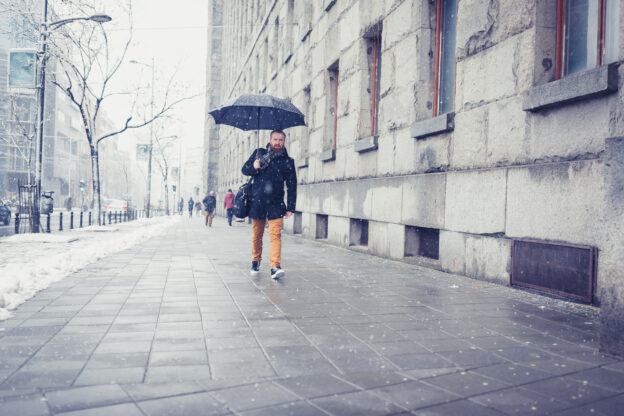New Yorkers are no strangers to dealing with snowy and icy weather during our long winter months. But slippery surfaces can catch any pedestrian off-guard, regardless of age or athletic ability.
If you slip and fall on ice around your apartment, you might wonder if you could pursue a personal injury case against your landlord for failing to keep the area safe. This article answers the question, “Can I sue my landlord for falling on ice?” and covers how to prove that your landlord was to blame for your injuries.
Common Icy Areas Around Apartments
Around New York City apartments, you’ll often find ice accumulating on sidewalks around the property, on exterior stairs, and in parking lots. It is not reasonable to expect your landlord to instantly remove ice from surfaces as soon as precipitation starts falling from the sky. Yet landlords are legally required to provide various things in apartments under their control to protect you from harm. Part of the responsibility of being a landlord involves watching the weather forecast, being familiar with potentially icy spots around the property, and either handling ice removal themselves or hiring a crew to do it.
Typical Injuries from Icy Falls
Slip and fall accidents on ice can result in very minor injuries that are little more than an embarrassment, as well as severe bodily damage that is life-changing. These are some common injuries that result from falls on ice:
- Concussions
- Broken bones
- Back injuries
- Spinal compression fractures
- Herniated spinal discs
- Shoulder separations
- Fractured wrists
- Muscle sprains
Proving Liability for a Slip and Fall on Ice
According to the City of New York Department of Sanitation, “every owner, lessee, tenant, occupant, or other person having charge of any lot or building must clean snow and ice from the sidewalks adjacent (i.e., in front of, on the side of, in back of) to their properties.” If snow stops falling between 7am and 4:49pm, you have four hours to clear it away, and you have 14 hours to clear it when snow stops between 5pm and 8:59pm. Meanwhile, you have until 11am the next day to clear sidewalks when snow stops between 9am and 6:59am.
Check your rental agreement for details about whose responsibility it is to remove ice and snow. It is common for landlords to be responsible for maintaining common walkways at multi-unit rental properties. Yet some lease agreements list snow removal as the tenant’s responsibility, so it really does vary from one contract and building to the next.
Can I Sue My Landlord for Slipping on Ice?
To determine the answer to this question for your specific circumstance, contact the Law Office of Jeffrey K. Kestenbaum. As your local landlord negligence attorney, we will review the details of your accident and advise you how to best proceed with your case. We will use all available evidence to make you successful with your claim, including photos of the icy surface, testimonies from your neighbors, and medical records that document your injuries.
To learn more about how pursuing a personal injury case works and for a free consultation, contact our office at 718-237-5586 or via online form. We encourage you to be safe and careful outside during icy conditions but are here for you 24/7 when winter accidents happen unexpectedly.







